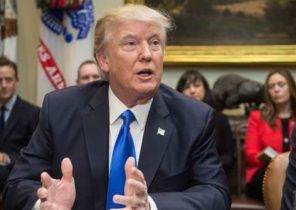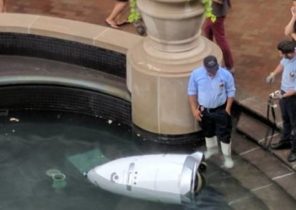At a time when the whole world is facing an unprecedented crisis of public health and the economy, the United States must lead the international community to cooperate with allies and to avoid actions that lead to further destabilization of the international situation. The decision to withdraw from the Treaty on open skies is just the opposite.
A week prior To remembrance the administration trump has taken several decisions that have led to the fact that the United States and the whole world was in a situation almost as dangerous as the Cuban (Caribbean) missile crisis in 1962. 21 may 2020, the US government announced its intention six months to withdraw from the “Treaty on open skies” — a move that retired air force General and former CIA Director and national security Agency Michael Hayden had called me crazy.
The Treaty, first proposed by the President, Republican General Dwight D. Eisenhower in 1955 and signed in 1992 by President, Republican George H. W. Bush, was signed not only between Russia and the United States, but also among the thirty one European country and Canada. It entered into force in 2002 under the administration of another Republican President George W. Bush.
The Treaty allows each of the participating countries to carry out unarmed reconnaissance flights over each other’s territory to gather information about military operations, and to provide that no state is planning a major offensive, and to share information with other members of the agreement. Since the Treaty’s entry into force States parties have carried out more than fourteen hundred of flights over each other’s territory.
As with any agreement, the open skies Treaty was not executed perfectly. U.S. officials claim that Russia has violated the conditions DON. For example, in 2014, Moscow has restricted the range of some flights over the Russian enclave of Kaliningrad up to 500 kilometers and has blocked all flights near the Russian-Georgian border since 2010.
However, despite the fact that these restrictions really are violations of the contract, they did not affect our monitoring capability. In addition, the United States in response to Russia banned flights over the Pacific fleet in Hawaii and on objects of missile defense interceptors in Alaska. Ongoing efforts to identify and eliminate violations remains a part of the enforcement of any agreement in the past, the United States and Russia could successfully solve problems.
But in General, the agreement has benefited the United States, and American society is much more open than the other signatories, especially Russia.
For example, four democratic member of Congress said in a letter to the administration trump that in accordance with the agreement, the United States has been able to fly in 2014 after the annexation by Russia of Ukraine (approx. lane: probably, the Crimea is better to put?), and in 2018, when the Russian caught three Ukrainian ship with crew in the Black sea. Ironically, the United States fly over Russia three times more than Russia flies over the United States. Moreover, other parties to the Treaty in 2002 spent more than five hundred additional flights over the territory of Russia, so they believe that the contract remains functional and useful.
However, most importantly, the output of the “open skies Treaty” will continue the process of destruction of the regime of arms control between the United States and the Soviet Union, which took decades, beginning in 1972 under President Richard Nixon. President George W. Bush began the process of undermining this regime of arms control in 2002, when the United States unilaterally withdrew from the Treaty on the limitation of anti-ballistic missile systems. Donald trump has accelerated the destruction of the regime, unilaterally, by withdrawing from the Treaty on the elimination of intermediate-range and shorter-range (INF) and refused to accept the proposal of the President of Russia Vladimir Putin to extend for another five years the new the new start Treaty (New START), which expires in February 2021.
Thus, there is no reason to exit the Treaty on open skies. Instead of having to withdraw from the agreement, the United States should upgrade the surveillance system on their older aircraft to match the more advanced Russian aircraft, but it also makes sense to discuss ways of modernization and renewal of the now defunct of the INF Treaty and the extension of the new start Treaty III.
Unfortunately, instead the administration trump made the situation worse actually considering the resumption of nuclear testing in the United States for the first time since 1992, in order to exert pressure on Russia and China and force them to sign a new three-way deal on strategic nuclear weapons. Such a move would condemn to destruction “the Agreement on a comprehensive nuclear test ban” and probably will trigger a new arms race.
Moreover, in the day when the United States announced the release of DON, the new special representative of the trump arms control Marshall Billingsley said the United States is ready to bring Russia and China into oblivion just to win a new nuclear arms race.
As pointed out by the former Minister of energy Ernest Moniz and former Chairman of the Senate armed services Committee Sam Nunn: “a Comprehensive, verifiable agreements on arms control concluded thanks to both Republican and democratic administrations, has enhanced the national security of the United States in the last fifty years. Break these agreements without viable alternatives, threatens the security of the United States and its allies today and for years to come”.
At a time when the whole world is facing an unprecedented crisis of public health and the economy, the United States must lead the international community to cooperate with allies and to avoid actions that lead to further destabilization of the international situation. The decision to withdraw from the Treaty on open skies is just the opposite. I hope that over the next six months, the administration trump will reconsider its plans for the withdrawal from the agreement.
Doctor Lawrence Dzh. Korb is a senior fellow at the Center for American progress, and also from 1981 to 1985 he served as the assistant Secretary of defense and taught at the coast guard Academy from 1971 to 1975.







